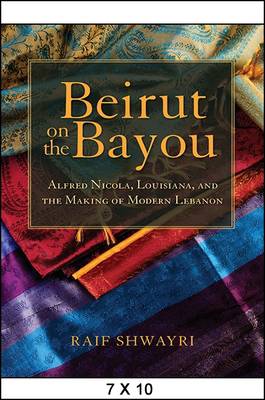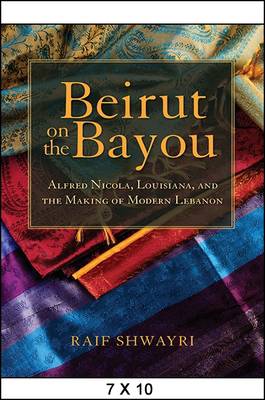
- Retrait gratuit dans votre magasin Club
- 7.000.000 titres dans notre catalogue
- Payer en toute sécurité
- Toujours un magasin près de chez vous
- Retrait gratuit dans votre magasin Club
- 7.000.0000 titres dans notre catalogue
- Payer en toute sécurité
- Toujours un magasin près de chez vous
Beirut on the Bayou
Alfred Nicola, Louisiana, and the Making of Modern Lebanon
Raif ShwayriDescription
Tells the story of Lebanese immigrant Alfred Nicola, the fortune he began building as a peddler in Louisiana, and the family that founded Al-Kafaat University, an iconic institution serving the underprivileged and disabled of Lebanon, through two centuries of unrest in the Middle East.
Raif Shwayri begins his family's story with his grandfather Habib Shwayri's arrival at Ellis Island in 1902. Having left Beirut, then a harbor city on the Syrian coast of the Ottoman Empire, only weeks before, he took the name Alfred Nicola and made his way to relatives in New Orleans. There, he began peddling down the Bayou Lafourche, befriending the communities living alongside the water and earning the nickname "Sweet Papa" for his kindness and generosity. When he returned home to Lebanon in 1920, he invested the money he had made, from years of peddling, in real estate and died a wealthy man in 1956. After his death, his youngest son, Nadim (Raif's father), turned his part of the inheritance into an endowment that started Al-Kafaàt, an iconic and unique institution in Lebanon that serves the handicapped and underprivileged.
Alfred Nicola's story, like the story of Lebanon itself, begins farther back in history. In its account of centuries of Ottoman rule, decades of colonial occupation, and years of internal political strife and civil war, Beirut on the Bayou intertwines a family narrative with the story of a people, of Lebanon in the making. From the Fertile Crescent that was Syria to the Crescent City that is New Orleans, the saga of the Shwayri family reflects the experiences of those Lebanese who walked the path of immigration to the United States, as well as those who stayed behind-or returned-to help forge a nation.
Spécifications
Parties prenantes
- Auteur(s) :
- Editeur:
Contenu
- Nombre de pages :
- 296
- Langue:
- Anglais
Caractéristiques
- EAN:
- 9781438460956
- Date de parution :
- 09-03-16
- Format:
- Livre relié
- Format numérique:
- Genaaid
- Dimensions :
- 183 mm x 262 mm
- Poids :
- 861 g

Les avis
Nous publions uniquement les avis qui respectent les conditions requises. Consultez nos conditions pour les avis.






